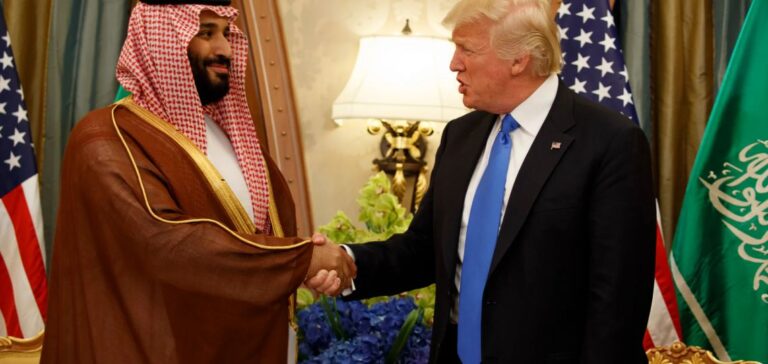US President Donald Trump is set to begin a state visit to Saudi Arabia with the objective of concluding an investment partnership reaching $1 trillion in strategic American sectors. This initiative, supported by an initial pledge of $600 billion from Crown Prince Mohammed bin Salman, comes amid a tense geopolitical climate, where hopes for normalising relations between Israel and Saudi Arabia remain largely out of reach.
Normalisation talks put on hold
According to several sources close to diplomatic circles cited by Reuters, the ongoing war in Gaza is a major obstacle to any resumption of talks between Riyadh and Tel Aviv. A ceasefire is being demanded by Saudi authorities as a prerequisite, but this condition faces opposition from Israeli Prime Minister Benjamin Netanyahu, particularly on the issue of a Palestinian state.
Despite the framework laid during Trump’s first term through the Abraham Accords, the current situation has led both parties to decouple normalisation from other aspects of their bilateral relations, including economic and security cooperation. The crown prince now requires an end to the Gaza conflict and a credible process toward the creation of a Palestinian state before returning to diplomatic negotiations.
Focus on economic and defence projects
Pre-visit discussions highlighted partnerships in the fields of arms manufacturing, artificial intelligence technologies and large-scale infrastructure projects. The trip also marks the resumption of talks on a US-Saudi security pact, initially envisioned as a formal treaty but now pursued in the form of more flexible bilateral security guarantees.
A civilian nuclear agreement is also on the agenda, according to three diplomatic sources. It aims to bolster Saudi Arabia’s energy capacities while meeting conditions set by the US Congress. The Trump administration seeks to leverage these economic commitments to reinforce US influence in the region and counter China’s growing presence.
Chinese influence and calls for regulatory relief
China has become increasingly embedded in Saudi Arabia’s development plans, notably through the Vision 2030 programme, with targeted investments in energy, infrastructure and renewables. In response to this strategic rivalry, Saudi leaders intend to use Trump’s visit to advocate for easing US regulations that limit foreign investments in sectors deemed critical.
Representatives of the Saudi government plan to urge Washington to adopt a more investor-friendly regulatory framework, particularly to facilitate capital flows from the Gulf. The aim is to attract more funds to the United States as Beijing intensifies efforts to divert this capital toward Asia.
A precedent that shapes expectations
The current visit echoes Trump’s first overseas trip in 2017, which was marked by the announcement of $350 billion in economic commitments between the two nations. According to Robert Mogielnicki, a scholar at the Arab Gulf States Institute, “the priority now is to maximise the economic and diplomatic impact of the trip without upsetting regional sensitivities.”
Trump is not scheduled to stop in Israel during this Middle East tour. Two diplomats also noted the recent absence of references to his controversial proposal to resettle Gaza’s population, a silence seen as strategic ahead of bilateral talks in Riyadh.






















